|
1-3 East Hill
Ashford
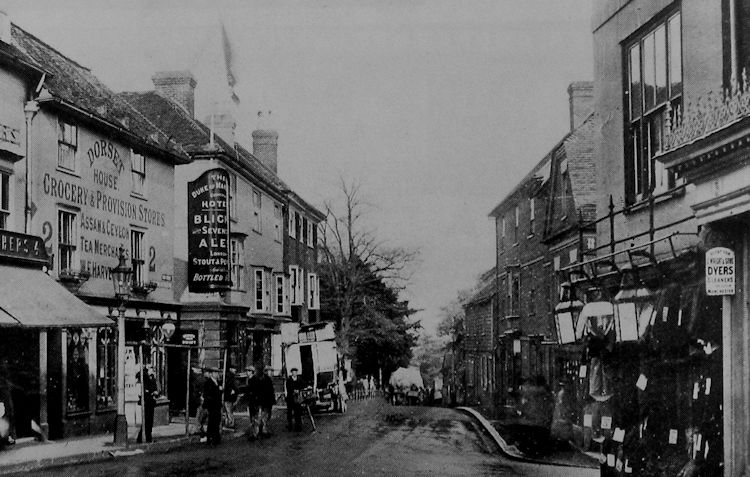
Above photo, date unknown, kindly sent by Christopher Green. |

Above photo, date unknown. |
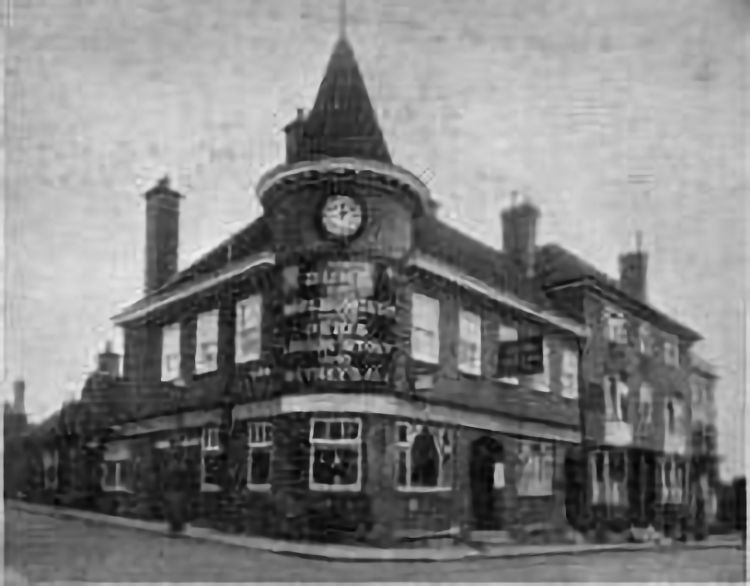
Above photo, date unknown, kindly sent by Christopher Green. |

Above photo, date unknown. |
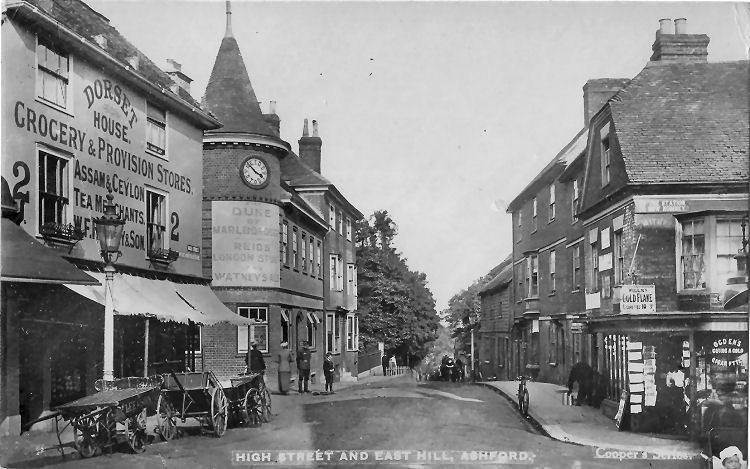
Above postcard circa 1925, kindly sent by Shaun Gardiner. |
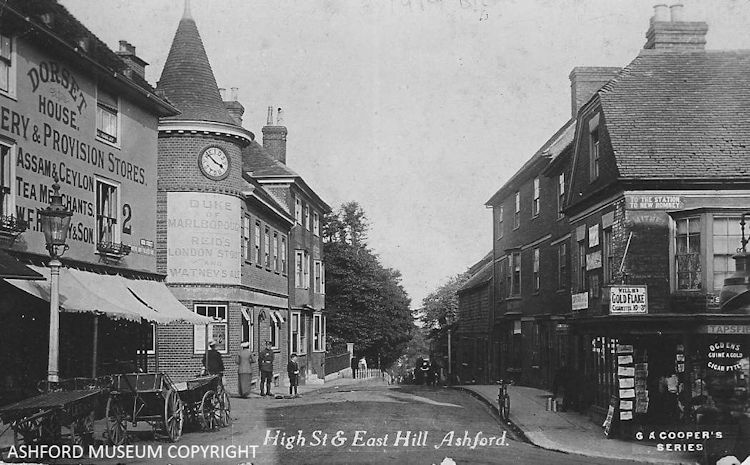
Above postcard, circa 1925, by kind permission of Ashford Museum.
Slightly different reproduction of top picture. |
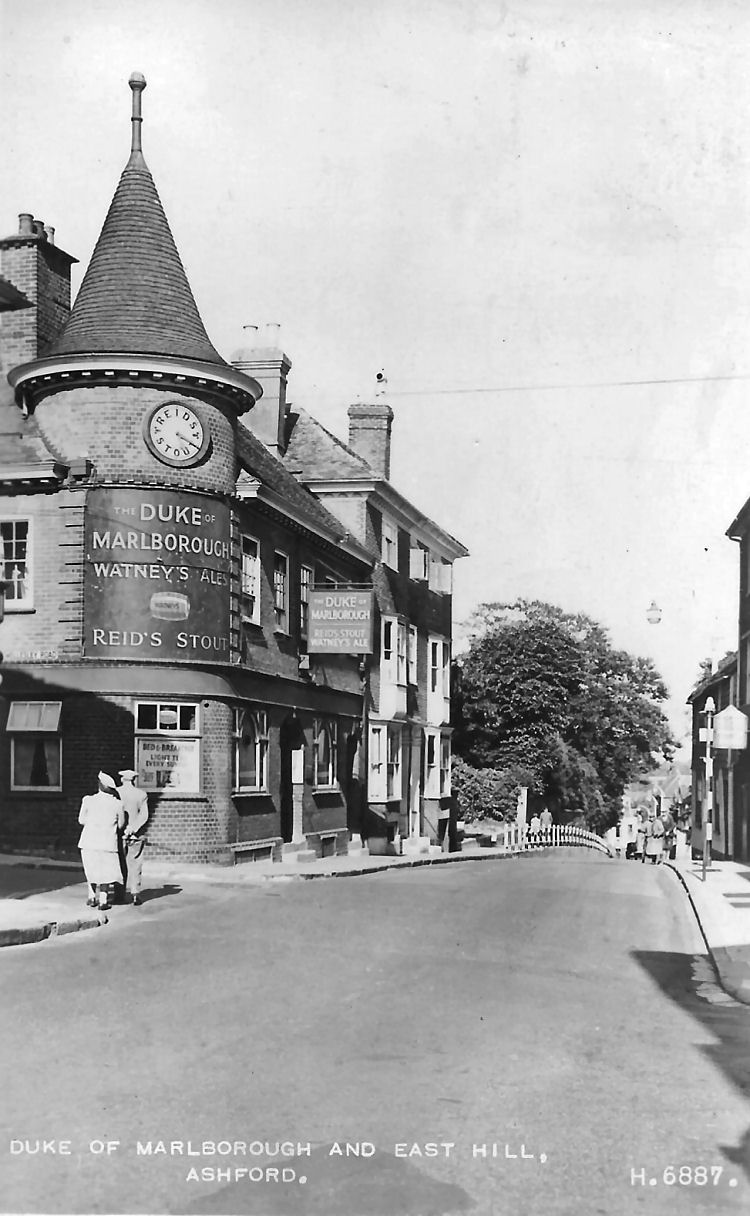
Above postcard, date unknown, from Sue Brown. |
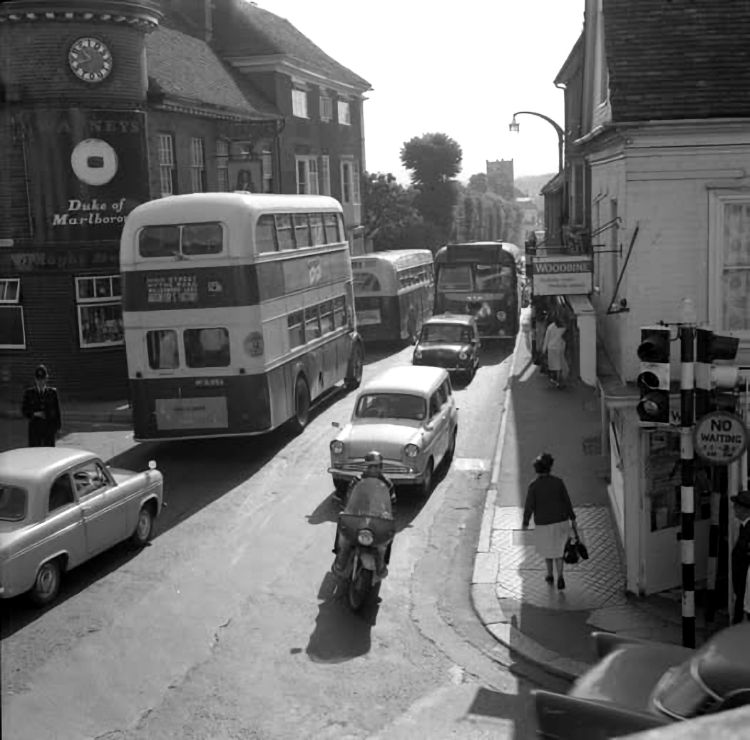
Above photo, date unknown. |

Above photo, 1960s, kindly sent by Garth Wyver. |
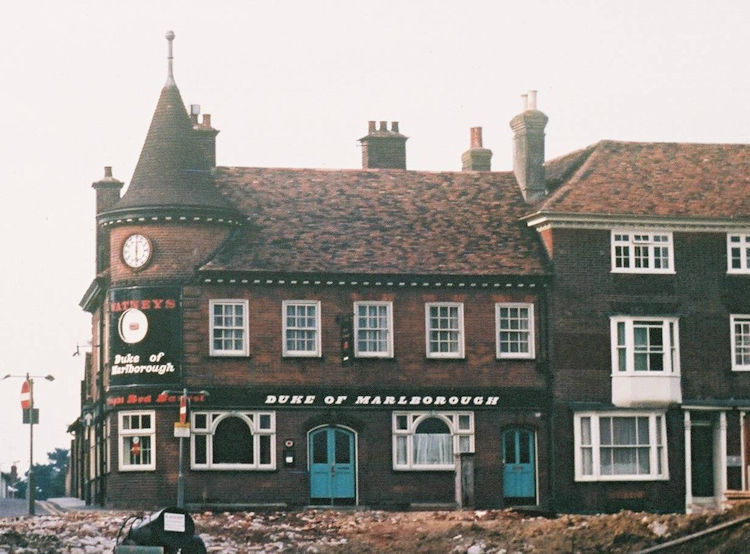
Above photo, 20 June 1971, by Jim Ashby. |
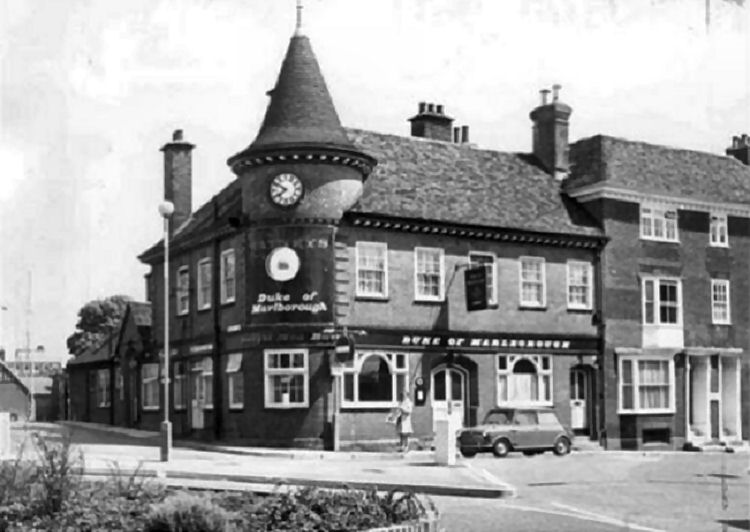
Above photo, circa 1972, kindly sent by Rory Kehoe. |

Above photo, date unknown by Stu Fyles. |

Above photo, date unknown. |

Above photo, date unknown. |
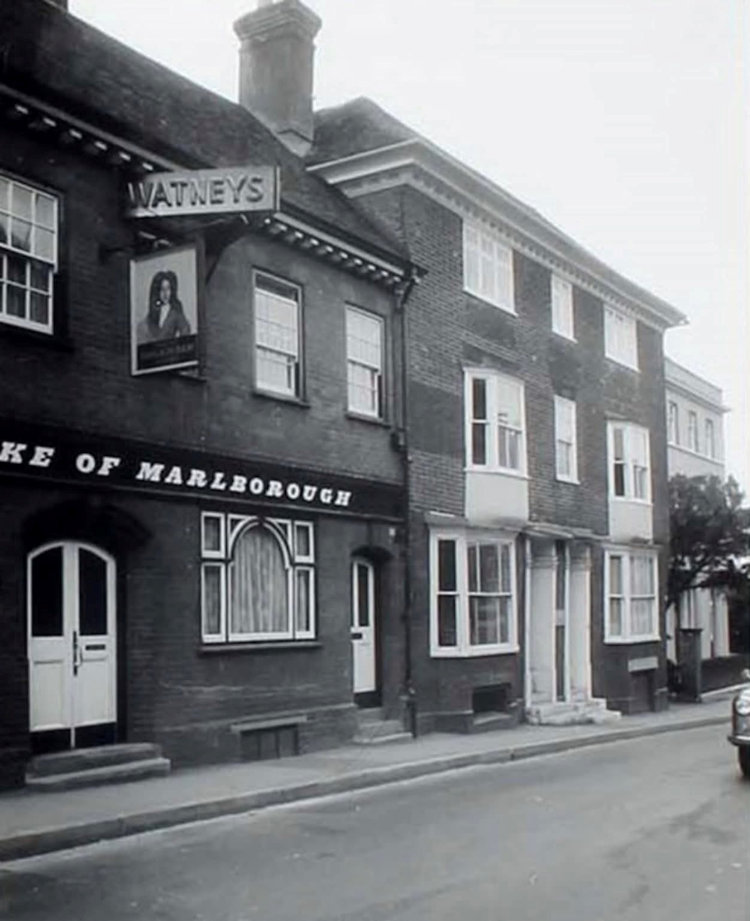
Above photo, date unknown. |
|
|
When built it was rebuilt at some time to depict a Kentish Oast House.
In 1791, Thomas Halk Sutton senior was a maltster, preparing grain for
the making of beer, at the "Duke of Marlborough". Two years later he became
the innkeeper at the "Saracen’s
Head."
The Pigot's directory described Robert Kittle as a brewer and the
premises contained a tap room called the "Malborough Tap" of which in 1861
had a separate licensee.
Richard Ticknall tells me that this was closed and demolished for the
construction of the Tufton Shopping Centre in 1975.
|
Kentish Gazette 16 February 1819.
Marriage.
Feb 11, an Ashford, Mr Richard Tunbridge, of Faversham, to Miss
Kettle, of Ashford, eldest daughter of Mr. Kettle, of the "Duke of
Marlborough," of that place.
|
|
South Eastern Gazette, Tuesday 1 June 1841.
Ashford.
A meeting was held at the "Duke of Marlborough," on Friday week, to
consider the propriety of establishing a Mechanic's Institute. We are
happy to say it was strongly supported, and a committee chosen to
further the object. We are much indebted to the professional gentleman,
as well as the tradesman, who so ably supported the meeting and the
cause.
|
|
Kentish Gazette, 2 October 1849.
ASHFORD.
The annual banquet of the noble brotherhood of Foresters took place at
the "Duke of Marlborough Inn," Ashford, on Tuesday last, when between
forty and fifty members and visitors were present. A most sumptuous
repast, which reflected great credit on the worthy host, Mr. Akhurst,
was prepared, and to which the guests did ample justice. The cloth being
removed, the usual toasts were drunk. The many advantages of this
admirable institution were most ably shown in a few brief but precise
speeches, made by the worthy chief, the sub-chief, and secretary of this
society, the last observing that its pecuniary interests were in a most
flourishing condition. The celebrated vocalist, Mr. Godden, of London,
highly amused the company with some of his favourite songs. The
fraternal feeling and conduct of the members, and the hearty welcome
given to the visitors, apparently created general satisfaction. On the
whole, everybody seemed heartily to enjoy themselves, and separated
asserting that they had spent a delightfully agreeable evening.
|
|
Kentish Gazette, 18 February 1851.
Wye.
On Monday the 10th instant, an inquest was held here by Mr. Delasaux, on
the body of Mr. Congreve Selwyn Morris, who
committed suicide by taking a large dose of opium.
It appeared that on Wednesday deceased came from Maidstone in a horse
and gig, and proceeded next day to Ramsgate,
with his brother, Mr. W. S. Morris, returning on Friday; that he went to
Mr. Jones, chemist as Ashford, for two shillings worth
of tincture of opium, stating it was to be for his brother, who is a
surgeon at Wye, and who had often had drugs from Mr.
Jones, which led him not to suspect anything wrong. After the deceased
left his brother to go to Perry Court, and the brother
did not see him alive afterwards. On Sunday he was found dead in a lodge
of Mr. Mills's, at Wye, and it was evident he had
been to so some hours. It ascertained that he had killed himself with
the opium, two ounces of which were deficient from the
quantity he had purchased.
A verdict was returned that "deceased destroyed himself while labouring
under a fit of temporary insanity."
We copy the foregoing from a contemporary, and append the following
letter as explanation of the true circumstances of the
case:- Wye, Feb. 15, 1851.
To the editor of the Kentish Gazette.
Sir:-
In the account of the inquest on my late brother, Congreve Selwyn
Morris, which appeared in the column of another
Canterbury paper a few days since, it is stated that he proceeded to
Ramsgate with me. It is with Mr. Selwyn Morris another
brother, (who is not a surgeon of Wye,) that he drove to Ramsgate to
spend a day with his sister. On their return, they parted
at Boughton Corner, a turning from the main road, Mr. Selwyn Morris
driving the gig to Wye, and Mr. C. S. Morris going to
Perry Court, which is about 5 minutes walk from thence, at the same time
saying that he he should soon follow him home.
Instead of doing so he went on to Ashford, where it has been since
ascertained he slept at the "Marlborough Inn." The
laudanum which he is stated to have procured in my name, and for which
he paid 2s. ought certainly not to have been given
without a written order; and in justice to myself, I am bound to say
that for the last 13 years I've never sent to any druggist in
the county of Kent a verbal order for laudanum or other permitted drugs.
I should consider culpable any medical practitioner
who did so, and any druggist who might comply to such order.
I wish also to state that my late brother had frequently complained of
pain in the head; had several times been subject to a fit
of sudden fainting; and a few months since had a severe fall on his head
from a horse at Maidstone; which circumstances I
am inclined to consider as predisposing causes to the act by which he
lost his life. Feb. 8th, in his 19th year. He was on the
most affectionate terms with all his near relations, and left a good
name at the Maidstone College School, which he left a few
days previous to his decease.
I am Sir,
Your obedient servant.
W. Morris.
|
|
From the Kentish Express, 14 June, 1856.
Ashford Petty Sessions. Saturday, June 7.
Before J. B. Wiklman, Esq., (chairman) the Rev. J. Dufton, W. Burra,
H. W. Carter, E. H. K. Hugesson, and G. E. Sayer, Esqs.
Alleged Robbery:- Harry Knightley and Mary Ann Shore were charged
with stealing 6s. 6d. from the person of Thomas Foley, of Ashford.
Prosecutor deposed:- I met the prisoners at the New Town yesterday,
and sold the male prisoner two umbrellas for a shilling. I came from
there in company with them as far as the "Victoria," where we had
something to drink; while there, the female prisoner put her hand in
my pocket and took out the money, which she handed to the other
prisoner. I came into the town for a policeman, and on my return to
the "Victoria," found the prisoners were gone. I afterwards found
them at the "Marlborough," and taxed them with the robbery, which
they, denied. I then went for Superintendent Fancett, who took them
into custody.
Superintendent Fancett deposed to receiving information of the
robbery, and taking the prisoners into custody; when they were
searched, a two shilling piece and a shilling were found on the man,
and a penny on the woman. Before searching the prisoners he asked
prosecutor what sort of money he had lost, when he said, a bright
two shilling piece, four shillings, and a sixpence. Prosecutor was
the worse for liquor.
The prisoners denied all knowledge of the robbery, and said
prosecutor was treating every one that came into the room; he also
lent three shillings to a sweep, with whom he afterwards quarrelled
and fought.
The chairman said the bench were of opinion that this was no case to
go before a jury, and the prisoners were discharged.
|
|
Brighton Gazette, Thursday 20 November 1862.
Stealing From a Cart.
A young man, named William Wilson, was brought up charged with stealing
a lady's dress of the Valley of 23s.
It appeared from the evidence that the dress was made by Miss west, of
Rye, for Mrs. Frances Banister, of Peasmarsh, packed in a paper parcel,
and placed in Mr. William Reeves's cart, near Mr. Larkins's yard, on
Wednesday last. Mr. Reeves left his car for a few minutes, and when he
returned the parcel was gone.
Information was given to the police, who communicated with the police of
the neighbouring towns, and Thomas Dunk, sergeant of the Kent
Constabulary, found the dress had been offered for sale at Mrs.
Patterson, keeper of the "Marlborough Tap," at Ashford, by the prisoner
and another man, both of whom he apprehended while walking towards the
gaol. The other man, whose name is John Franklin, slipped his hand out
of the handcuff and escaped.
Mrs. Pattenden identified Wilson as one of the two who offered the dress
to her.
Wilson said he did not steal the dress, and he knew nothing about it.
He was committed for trial.
|
|
From the Kentish Gazette, 9 May 1865 Ashford PS
1.bmp"
Petty Sessions. Saturday. (Before G. E. Sayor, Esq., Captain
Billington, Major Groves, and E. H. K. Hugessen, Esq., M. P.)
The Results of Intemperance.
A respectably dressed man, named Edward Hardener, a tin-plate
worker at Brabourne, pleaded "not guilty" to a charge of stealing a
pewter beer measure, valued 3s. 6d., from the "Duke
of Marlborough Inn," Ashford.
Ellen Hopper, wife of Stephen Hopper, landlord of the "Duke
of Marlborough," deposed that the prisoner come into her
house on Wednesday evening, and called for a pint of beer, which she
served him in the pewter measure produced. Shortly afterwards she
was told by Mr. Rose, of the "Royal
Oak Inn," that a man had gone up the street from her house with
a pewter pot, and she then found that the prisoner had slipped out
of the house without her noticing him.
Edwin Rose, landlord of the "Royal
Oak," deposed that he was standing at his door, when he saw the
prisoner on the opposite side of the road, drinking from a pewter
pot. Prisoner threw the remainder under of the contents away, put
the pot in his pocket, and walked off.
Police-constable Frank Quested deposed that from information he
received he apprehended the prisoner in High Steet, and found the
pot produced in his coat pocket. Prisoner said he had it from the "Queen’s
Head."
The prisoner, in defence, said he was so tipsy he did not know
what he was doing, he had no intention of stealing the pot.
In answer to the Bench, Mrs. Hopper said the prisoner was drunk;
she did not desire to press the charge.
Mr. R. Rabson gave the prisoner a character. He was quite the
reverse of dishonest; but had an unfortunate weakness for drink.
The Bench ordered the prisoner to be imprisoned until the rising
of the Court, and cautioned Mrs. Hopper not to serve drunken men
again.
|
|
Kentish Gazette, 29 March, 1870.
Inquest.
On Thursday Afternoon an inquest was held at the "Queen's Head Inn,"
Mill Bridge, before Walter Furley, Esq., deputy coroner for East
Kent, on the body of James Moss Hobday, a man aged sixty, who was
found dead in bed under the following circumstances:-
William Dodd, landlord of the "Queen's Head," denoted:- The deceased
came to lodge at my house on Saturday evening last. I have known him
for twenty years past. He formerly lived at Boughton Lees, and was
mailman to his father, who was a brewer there. He was then in a
comfortable position in life; but for some time he has been in bad
circumstances. Two other men occupied the same bedroom in my house
as the deceased. I have not heard of any squabbling having occurred
between them. The deceased was not cheerful; the first night he came
he complained of being very unwell, but did not say in what way he
was unwell. He had no meals in my house; he generally came home
early in the evening; had a pint of beer and a biscuit, and went to
bed he told me he had been employed at the "Duke of Marlborough
Inn," but had been paid off from there the week before. On Tuesday
evening he had his pint of beer and biscuit as usual, and I saw no
more of him. I called the other two men up at halt-past five o'clock
the next morning, and they went to their work. Not seeing anything
of the deceased, I went to the room about half-past nine o’clock,
and found him lying in bed quite dead. One arm was out of the bed,
and he seemed to have died without pain or struggle, us the clothes
were not in any disorder. I found the phial bottle produced under
his bolster. It was empty and corked. There was no label on it.
Dr. George Wilks deposed:- From instructions received, I made a post
mortem examination of the body this morning. There were no marks of
violence on it. I suspected the cause of death, but I deferred
forming an opinion till I examined the bottle produced. I found it
contained minute crystals of oxalic acid, and I have no doubt death
resulted from taking that poison. It is never used as a medicine,
and could not have been taken for the purpose of curing disease or
alleviating pain. I am of opinion that a very large quantity was
taken, from the quiet mode in which death had occurred. When taken
in a very large quantity the person usually faints; but when in a
small quantity intent pain is suffered. Oxalic acid can only be sold
under the usual restrictions for the sale of poisons; and it is
usually bought in a crystallized form.
Mr. Beken, one of the jury, stated it was frequently bought in that
way and mixed with water to clean brass, harnesses, and boot lops.
William Fisher, labourer, deposed:- I and another man slept in the
same bedroom as the deceased. On Monday evening, about nine o'clock,
as the deceased was undressing to get into bed he suddenly put his
hand to his right side and exclaimed "Bless me what a pain I have
here." I said "Sit down, my good man, on the bed," He did so, and
attempted to get his trousers off but could not. I advised him to
wait till he felt better, and he did so. In a few minutes he
undressed and got into bed. I asked him how he felt, and he replied,
"All right; good night." On Tuesday night about half-past eight
o'clock he said he did not feel quite right and should go to bed. I
came up into the room about half-past nine, and I asked him how he
was. He replied, "Pretty middling," and began complaining of the
hardness of the times; he said he could not get work, and he did not
like to beg. I wanted to go to sleep, and bade him good night.
During the night I was awakened by a loud gurgling noise which the
deceased was making. I told my fellow lodger that it was hardly like
snoring, and that if it continued I should go and wake the deceased
up. ln a minute or two all was quiet, and I went to sleep again. In
the morning I went out without noticing the deceased.
William Crump, labourer, the other lodger, gave similar evidence;
and added he did not think much of the noise in the night, as the
deceased was in the habit of snoring loudly.
P.O. Hollands said that no money was found on the deceased; he had
two pawn tickets for clothes pledged by him.
The jury returned a verdict to the effect that deceased killed
himself by taking oxalic acid when in an unsound state of mind.
|
|
From the Whitstable Times, 28 July, 1900.
PETTY SESSIONS. TUESDAY.
Richard Thomas Simpson, landlord of the "Marlborough Hotel," Ashford was
summoned for refusing to admit the police to his licensed premises on
their demanding it in the early morning of July 2nd. Mr. Bracher
appeared to prosecute and Mr. Drake defended. Sergeant Callaway stated
that hearing a noise just after midnight at the defendant's house he
went to the door and knocked. On looking through the glass of the door,
he saw the defendant moving about, and noticed him look in his
direction, but defendant kept him waiting eight or ten minutes before he
opened the door. On entering he found seven or eight persons in the room
who Simpson said were friends and his guests. After taking some of the
names he called to P.C. Larkin to come in and assist but defendant
refused to admit him, pushed him out of the door, and locked it in his
face. The defence was a denial of the pushing but Simpson admitted that
he had told Calloway he could not have a house full of policemen, while
a witness, Alfred Goldsmith, the defendant's brother-in-law said he
heard defendant say to Larkin "You aint coming in here."
The Bench imposed a fine of £2 with costs, but decided not to endorse
the license, Simpson's previous character having been good.
|
LICENSEE LIST
KITTLE Robert 1819-32+
 
CONSTANCE Richard 1840+

AKHURST Edward 1849-51+
 (age 52 in 1851
(age 52 in 1851 ) )
WORGER Mary 1858+

PATTENDEN John 1861-62+ (Malborough Tap) (age 30 in 1861 ) )
CHEESEMAN Hannah 1861+ (age 36 in 1861 ) )
HOPPER Stephen 1862-74+ (also brewer age 39 in 1871 ) )
 
SMITHWHITE Margaret 1881-82+ (widow age 50 in 1881 ) )
HAMMAN Henry H 1891+ (age ?? in 1891 ) )
SIMPSON Richard T 1900-03+ (age 31 in 1901 ) )

READER John 1913+
BATT Alfred 1922+
PEARMAN William Thomas 1930+
DUSTAN Wallace George 1938+
https://pubwiki.co.uk/DukeofMarlborough.shtml
http://www.closedpubs.co.uk/dukeofmarlborough.html
 From the Pigot's Directory 1828-29 From the Pigot's Directory 1828-29
 From the Pigot's Directory 1832-33-34 From the Pigot's Directory 1832-33-34
 From the Pigot's Directory 1840 From the Pigot's Directory 1840
 Census Census
 From Melville's Directory 1858 From Melville's Directory 1858
 From the Post Office Directory 1862 From the Post Office Directory 1862
 From the Post Office Directory 1874 From the Post Office Directory 1874
 From the Kelly's Directory 1903 From the Kelly's Directory 1903
|













